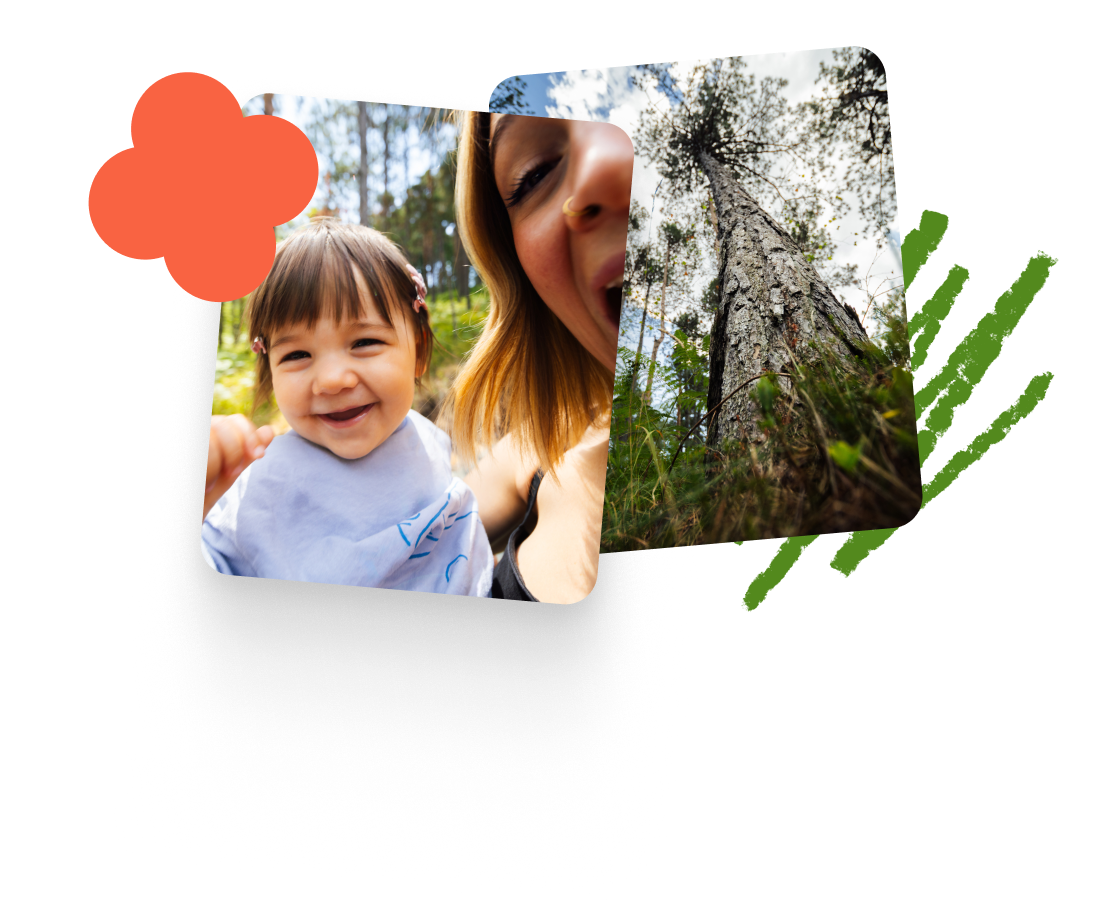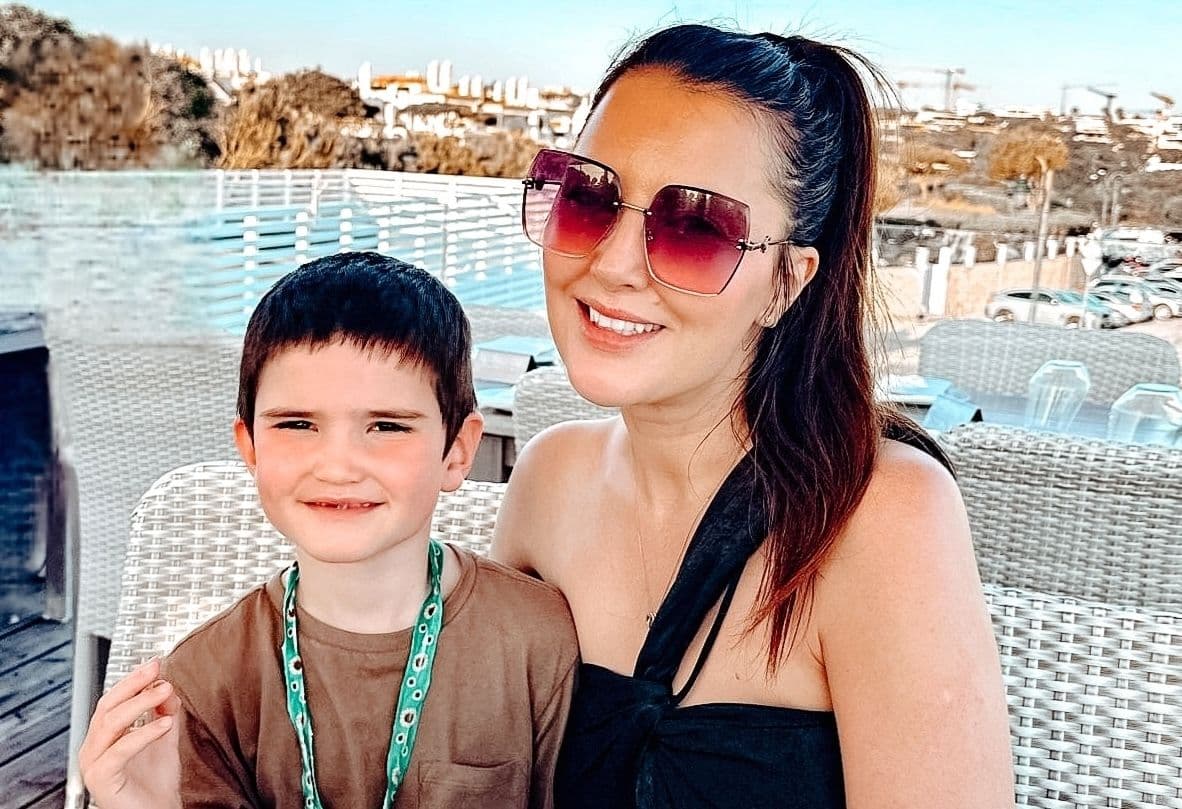
is now part of
Joy Parenting Club!
Families and care organisations using Heba will now have the option to also join Joy. For any questions, reach out to us at hello@heba.care

Families and care organisations using Heba will now have the option to also join Joy. For any questions, reach out to us at hello@heba.care

June 24, 2024
Caring for her autistic son saw this mother of two stepping away from her teaching career – and finding her feet in advocacy.
During the process of her son’s diagnosis, when Andrea Davies turned to Google for answers about autism, she was met with a lot of “doom and gloom”. But as this mother’s sizeable Instagram following will tell you, amid the challenges of caring for a child with complex needs, her family life is full of light and fun.
Living in the English town of Warrington with her husband, Mike, now six-year-old Oliver and their four-year-old daughter, Lilly, Andrea’s days have looked very different since departing her teaching job. It took time, learning to lose the shame around asking for help – and building her own online community – to get into the groove of full-time caring. And now, she’s giving countless other families hope.
Here, Andrea shares how she’s found that groove, shaking off unwelcome attitudes along the way. As she says, “Don’t listen to any judgement from others. Unless they are living your life, they don’t get a say.”

When we are expecting a child, we usually expect to be their parent, not their ‘carer’. Do you identify as Oliver’s ‘carer’?
I very rarely think consciously about being Oliver’s carer but the reality is, I am. Oliver is my first child and he essentially became my “normal”. We have been through some really tough times and in those times I definitely felt the carer role more, but having Oliver as my first child, I would say, has made things easier to accept.
I had to give up my career as a secondary/A level teacher due to Oliver's needs and the lack of support available to families who have SEND children – and that was when I really felt the term “carer” was something that I was.
What did you find most challenging in the early stages of navigating Oliver’s autism diagnosis? And what helped you during this time?
I found people being dismissive of Oliver’s needs very hard. I knew he wasn’t developing typically and to be told to wait, that he will “catch up”, or to have myself judged as a parent – as if I was doing something wrong – was very challenging and took a huge emotional toll.
Having a meeting with a professional, feeling shamed and then having to wait 12 months for any further communication meant I had a lot of time to sit and blame myself. My husband was amazing about this and helped me realise it wasn’t my fault, which then made me start to fight for Oliver’s needs. Having someone who isn’t dismissive around you is so important.

How did you start forming connections with other parents raising autistic kids, and what changed for you once you started forming these connections?
I went on social media and began to look for people who had autistic children. There aren’t a lot of people who are happy to share their life online, but I did manage to find a couple of accounts that I resonated with and this made me feel less alone. I was able to see progress in those children and it helped me believe in myself and believe what I knew about Oliver was true.
Why did you decide to start creating social media content and sharing some of your experiences – and what impact has this had on your life?
During Oliver’s diagnosis process I was always online typing questions into Google, looking at forums to find out about his potential development and, to be honest, it was very doom and gloom. I struggled to find a positive outlook, real life scenarios or children who presented as Oliver did. But when I found just one child who seemed similar to Oliver, it brought me comfort.
I started my social media account prior to Oliver’s diagnosis, during lockdown when everything had paused for us in that department. It initially started as an outlet – a place to talk about my experience – and I thought that maybe if one other person saw my account, who was going through a similar thing, it might bring them comfort.
In terms of how my life has changed, I've gone from being a qualified teacher to now being an autism advocate. It’s changed my outlook completely and I now feel so happy that I’m able to support other families and show them it’s not all doom and gloom.
Nowadays, what do you find most challenging about being a parent carer? And on the flipside, what brings you the most joy?
The unknown is hard and I very rarely think about the future, because I have no idea what’s to come. I know that Oliver, at the moment, is going to need to be cared for full-time, for the rest of his life. I know that as he gets older and bigger, I’m going to face different challenges to those we have now and I can’t tell you what those challenges are going to be.
I love watching Oliver's development. He is so loved and I feel so proud of every achievement and step forward he makes.

What is Oliver’s relationship with his sister, Lilly, like? What do they tend to do together?
Oliver avoided Lilly completely for the majority of her first year with us. He would leave the room if she was brought in and he didn’t really acknowledge her until she began to move around independently. Now, they have a beautiful bond. He laughs with her, he will go into her room and sit in her bed with her. On holiday they share a room and when we get back he will still want to stay with her still.
Lilly has been the driving force in the development of their relationship. She is patient, confident and understanding of Oliver. They both love swimming, so they really connect when doing that together.
You mentioned that you gave up your teaching career to care for Oliver. Can you tell us more about why you made this decision – and how you feel about it?
It was an impossible job to have, as there are no breakfast or after-school clubs for children who have needs as high as Oliver. There is also no full-time provision for school holidays. I have received Oliver’s allocation for this year’s summer holidays and over the seven weeks, he has been allocated four days. I couldn’t go into a full time role in a different capacity because of all of the school holidays.
I initially struggled with the change because most people associate you with your job title and make assumptions about you based on that. I would receive a completely different reception from people when telling them I was a teacher, compared to my child’s carer, and I had to learn to ignore the societal response.
I also had to learn who I was outside of my job. Conversations changed, friendships drifted, all because I was no longer in full-time work.
What supports have you put around yourself – or do you hope to put around yourself, as a carer?
I make sure I take time for myself. I lost a lot of that time in the beginning because of how emotionally and physically challenging things can be as a carer, but now, I ask for help without shame. I’ve searched for what is available to support carers in my region and I’ve put these supports in place.
What do you wish other people knew about life as a parent carer?
That it’s not easy and I’m not a “housewife”. I have sacrificed a lot of myself to take care of my son and I have taken on a lot in order to give him the support that he needs. There are a lot of things that go on behind closed doors and a lot of professionals involved to ensure Oliver is cared for in all aspects of his life – and I’m the one who manages that.
I would like others to truly think about the reality of being a parent carer. It’s not a choice or a way to get benefits. I wish all people approached us with openness and empathy.
What advice do you have for parents who are new to caring for an autistic child?
Don't forget about yourself or isolate yourself. It’s so easy to become all-consumed with your child’s needs but you have to put support in place so that you can have respite, so that you can be the best version of yourself. It’s not straightforward to do that and it can take time, but long-term, it’s worth it.
Also don’t listen to any judgement from others. Unless they are living your life, they don’t get a say.
Looking to the future, what are your hopes and dreams around how Oliver is cared for and your role in his care?
I want Oliver to continue to be cared for in the understanding and supportive way he is now. I know I will always do that, but there will come a time when I will need more support and I hope that those involved in that are in the professional role for the right reasons and have a love for those individuals who require such support.
Is there anything else you’d like to add?
If you are in a similar situation to myself, please do come to my instagram. My inbox is open so send me a message/voicenote and I will help in any way I can.
Follow Andrea's Instagram account @mummyandherthree.autism
Let’s clear out the complexities of care. Try Heba for free here.
Want to share your parent-carer story? We’d love to hear it. Get in touch with our team at hello@heba.care